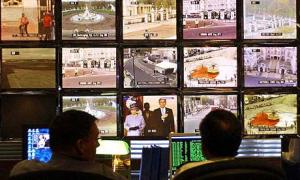by: Tom Corelis

Surveillance operators monitor CCTV feeds in London. (Source: The Guardian)
Rights groups outraged
Hot off the heels of news indicating that widespread civic CCTV deployment has little meaningful impact on crime, new reports indicate that local UK governments are using CCTV to prosecute petty crimes, including cases of littering, the misuse of a disabled parking passes, and dog owners who fail to clean up after their pets in public.
According to the BBC, local authorities have abused the Regulation of Investigatory Powers Act (RIPA) more than 100 times in the past 12 months, based off of interviews with 46 out of the 468 local governments in the UK.
In one of the more infamous examples, a government council admitted that it invoked RIPA in order to track a family that it suspected was living outside of a school’s admissions area. James Welch, legal director for rights group Liberty, called the abuse a “ridiculously disproportionate use of RIPA,” noting that it would “undermine public trust in necessary and lawful surveillance.”
RIPA was passed in 2000, in response to a rapidly-growing usage of the internet and strong encryption. The law both allowed and governed the use of surveillance, interception, and “covert human intelligence sources” in efforts to combat crime and terrorism.
Liberty director Shami Chakrabarti compared the government’s current scandal with CCTV to using a sledgehammer to crack nuts. Her group, as well as others such as Privacy International, called for a complete, “root and branch” review of the country’s surveillance and privacy laws.
Accusations against local governments are compounded by a number of recently-arising facts, including one that found that only 3% of street robberies in London are solved with CCTV-gathered images – despite the UK’s highest per-capita deployment of surveillance cameras in the world. One such report, published in The Guardian, attributes their lack of use to police investigator laziness and citizens’ lack of fear due to the fact that they think that the “cameras are not working.” Police departments attributed it to a lack of meaningful collaboration, and have since called on work to produce a national database of offenders.
“There are strict rules to protect people from unnecessary intrusion,” said Local Government Association chairman Sir Simon Milton. “Whenever a council applies to use these powers they must prove that it is both necessary and proportionate to the crime being investigated.”
Chakrabarti was not satisfied, however: “There are better ways to achieve the objectives without using counter-terrorism laws,” she said.
“You can care about serious crime and terrorism without throwing away our personal privacy with a snoopers' charter.”



